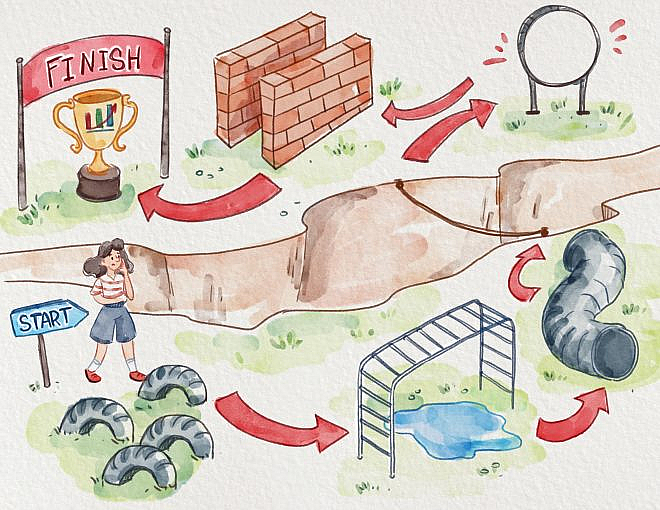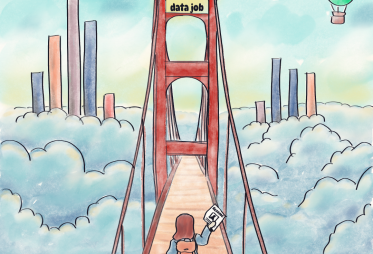A successful data practitioner has a visible impact on their organization. They may shape meaningful tactical and strategic decisions, build products that drive growth, or design experiments that shed light on the best path forward. They are sought-after thought partners for teammates and stakeholders, and generally feel satisfied that their work matters to the success of the company.
We have many conversations in the Locally Optimistic Slack community about career growth and what it means to be a senior data professional. One consistent theme in those threads is that senior data team members can independently and consistently have visible impact. On the other hand, more junior team members need more support or have more mixed success in influencing the organization through their work.
The difference between these junior and senior contributors is rarely in technical skill levels; instead, successful senior data professionals have particularly strong collaboration, communication, leadership and strategic skills. Focusing on acquiring these softer skills can accelerate your growth and expand your impact.
Technical skills aren’t enough to grow your data career
As an industry, we seem reasonably well aligned that senior independent contributor data roles need to exist to provide opportunities for career-long professional growth and promotion without taking on management roles. I am a big proponent of career ladders to help make these growth expectations more clear.
However, many career ladders aren’t explicit enough on the collaboration, leadership, and strategic skills necessary for success in data roles. I refer to these as soft skills not because they are easier to acquire (this series exists because they aren’t), but rather because they are squishy. They are less well-defined and harder to measure than technical skills. This softness, and their fuzzy presence in structured career ladders, can make it hard for individual contributors to understand what might be holding them back.
Many career ladders aren’t explicit enough on the collaboration, leadership, and strategic skills necessary for success in data roles. This can make it hard for individual contributors to understand what might be holding them back.
In part, this is intentional; there is no one way to be an effective contributor, and a good career ladder focuses more on the visible outputs of a team member at various levels of seniority than on how they accomplish those outputs. But these non-technical skills are a critical part of becoming a sought-after thought partner for teammates and stakeholders, expand the impact and success of your projects, and help you feel satisfied that your work matters – so we as a discipline need to do better.
Clear expectations increase equity
And so, I’m attempting to decode these soft skills; to put out some shared language we can use to make those squishy expectations more solid. I want to help individual contributors to understand how to build these skills. I also want data managers to know how to provide clear, constructive feedback for where their team members should focus to most expand their impact (whether a team member is actively aiming for a promotion or not).
This is particularly important because unclear definitions leave a gap of interpretation that particularly impacts folks coming from other disciplines or from non-traditional backgrounds. “Soft skills” can, along with nebulous ideas like “culture fit” and “professionalism,” be a thin veil for bias and discrimination. Using clear language for expectations and feedback can help create an environment where data professionals from diverse backgrounds can thrive.
This is post 1 of a longer series that I hope will be a valuable resource to help level-up individual contributors in data. I’ll explore where you can focus to amplify your impact and grow as a data leader, aiming to clearly and explicitly outline how you can help your teammates grow as well.
And yes, this growth just might also help you get a promotion.
Career growth takes time and feedback
Before we get into specific skills, let’s talk about the baseline requirements: for any of these skill groups, time and feedback are critical to your growth.
Have patience – exposure to a wide range of experience happens only with time
The reality of career growth is that there is really no substitute for time. It takes time to develop each skill that you need, and it takes even more time to learn how to combine those skills to be most effective in any given situation. With technical skills, there is a clear loop between identifying a gap, learning a new approach or technology, finding opportunities to apply it, and learning about the nuances of that approach. Brittany Bennet describes this well:
as in, just bc i don’t know it today doesn’t mean i can’t learn it with time.
— b bennett | 500+ connections (@thebmbennett) March 15, 2023
as in, learning happens through encountering problems and solving them repeatedly
as in, having more than experience is mainly a product of time, and i should focus on the problems in front of me
The need for time is even more acute as you build softer skills; perhaps because that last step, about the nuances of applying the skills, is even more critical. Soft-skills are context-dependent, so you need to be exposed to lots of context to grow them well.
This can be frustrating when you’re a smart, ambitious junior practitioner. You know all the tools and approaches you need, you’ve done some really good work, and you deserve a promotion. But many of the skills and competencies I’ll talk about in this series cannot be gained in any way other than showing up, day in and day out. Some of this is pattern recognition, some of it is domain expertise, and a lot of it is realizing how you need to change your approach to various situations and stakeholders that will cross your path. You will learn from your successes, and you’ll learn more from your failures as you spend time in the role. As Erika Pullum put it in her great article about management seat time,
It’s hard to understand what seat time is when you’re young and ambitious and smart. It’s impossible to see the value in seat time when you don’t have it, which is even more frustrating.
Erika Pullum, Management Seat Time
The same is true for individual contributors. The best way to ensure you can lead a wide variety of projects to success is to have personal experience with a broad range of teams and situations. You probably won’t have seen the exact same challenge, but you will have built the agility and confidence to balance applying your previous experiences with flexing into new approaches.
That doesn’t mean there is a straightforward equation for progression, like “it takes five years to become highly impactful as an analyst.” Your experience, your role, and your mindset will all shape how quickly you develop these skills. Working in a high-growth company is an accelerant. Experience across several different stages of company development is an accelerant. Reading books about leadership, strategy, and how other companies have approached challenges is an accelerant.
Perhaps you have all of these accelerants – you are a well-read, empowered, growth-oriented analyst in a fast moving start-up with great feedback loops and a wide range of projects to work on. Even in that situation, developing the skills for impact will take time – sometimes longer than you wish. Hopefully this series will help you recognize where to focus so you can grow as quickly as feasible – but be patient with yourself and appreciate the ride. After all, a career is long and the quest for mastery of your craft never ends.
Be proactive – ask for and leverage feedback to accelerate your growth
Strong feedback loops are the key to developing many of these skills – you’ll need to identify who can give you feedback early and often. This can (and should) be your manager, but it should also be your teammates, your stakeholders, and your data community peers. Think about how you can get input throughout the span of a project, rather than waiting until the end, to help you improve outcomes as you go.
Determining a few areas of focus can help you ask more pointed questions about the skills you’re most focused on developing. The more specific your requests for feedback, the easier it is for those around you to home in on feedback that will help you. Ami Vora has a great series of articles about getting feedback that I recommend starting with- how to solicit constructive feedback, how to deal with difficult feedback, and how to ensure you’re getting plenty of positive feedback as well.
Future articles in this series will focus on specific skills and areas that increase your impact in data roles. Reading about those skills may help you recognize some of your own failure modalities, but you may also need to find a sounding board who can help you honestly identify where your skills are less-developed. A good manager, close collaborators, or a coach can all be helpful in identifying where to focus your feedback requests.
The more specific your requests for feedback, the more likely you are to get actionable input that accelerates your learning curve.
Find more opportunities for feedback throughout your projects
▶️ Early on in projects, you can ask questions like:
- What could go wrong in this project? What am I not thinking about?
- How will this impact our biggest company priorities? How can I make that impact bigger?
- Who or what might prevent this project from having impact?
- What stakeholders are we missing who could improve the outcomes?
⏸️ After you deliver work, you can ask questions like:
- Is there anything I could have done differently to make it easier to work with me?
- What isn’t as clear and compelling as it could be?
- Who isn’t wowed by this? (and then go ask that person for more feedback!)
- How could I have communicated that idea more effectively?
- Is there anything else I should do to ensure this recommendation makes it to reality?
- Is there an opportunity to share this work in other ways to drive knowledge and action in other parts of the company?
🔁 Finally, remember that a feedback loop circles back to the beginning. The full process of effectively leveraging feedback includes:
- Asking for feedback,
- Choosing what feedback to respond to,
- Responding to the feedback and changing your approach or behavior, and
- Following up on the feedback.
This final step both ensures that you continue to get feedback on your growth areas and helps those around you recognize your growth. If someone gave you the feedback that your takeaways could be more clear, circle back to them, talk through what you changed, and see if they have any other thoughts. Having the same conversation with your manager (“I got some feedback from Jane that my takeaways were unclear, can you look at the updates?”) ensures that they see your effort and development as well.
What’s next – the data soft skills inventory
This is the first of a series of posts that each explore a broad area of skills and approaches that senior data practitioners exhibit. From my experience as a practitioner and leading multi-disciplinary data teams, there are a few big skill areas that enable impact:
- learning in the workplace,
- how you use your technical skills,
- the scope of your work,
- how you execute on projects,
- how well you understand your business context, and
- how you work with your peers and stakeholders.
We’ll dig into each of these in more depth in subsequent posts. Up first: learning in the workplace – look for it next week. And as always, let’s chat about this in LO’s slack community. I would especially love to hear more about how you solicit feedback to help yourself grow.






